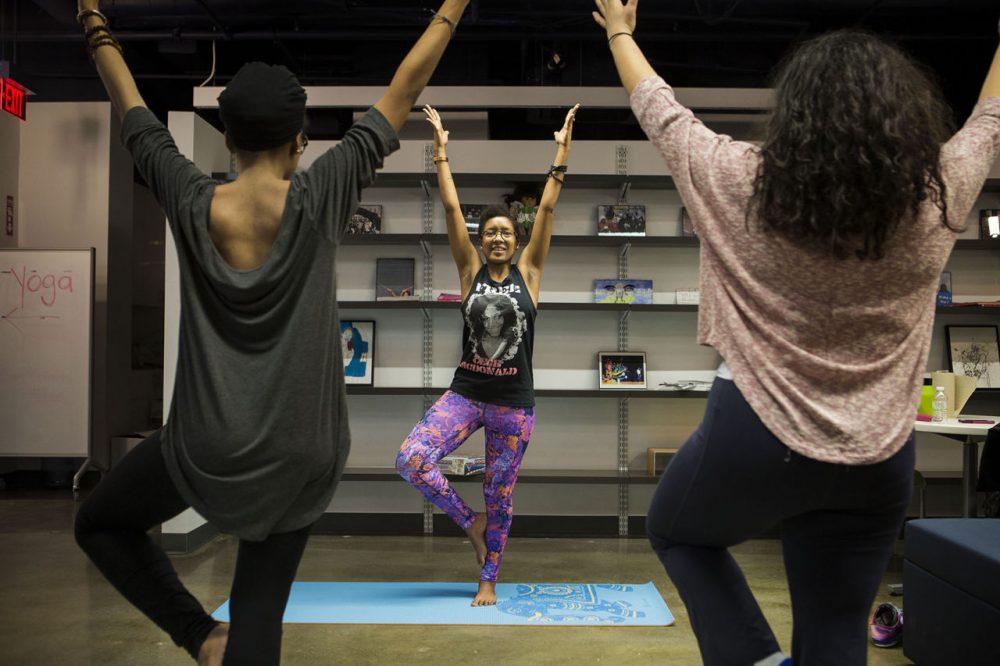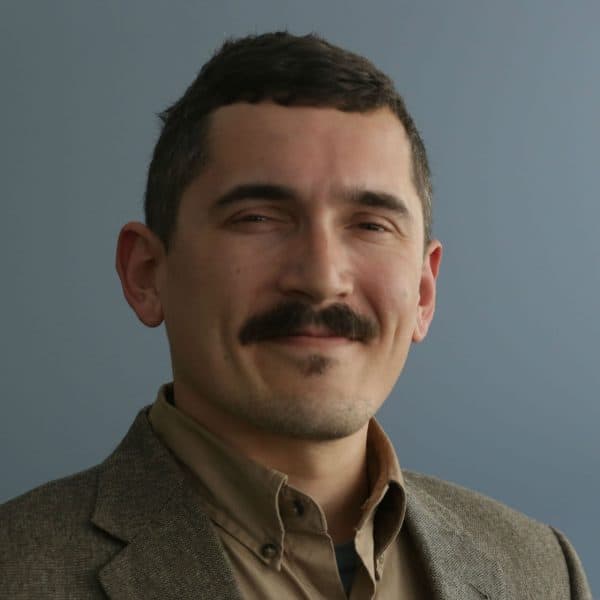Advertisement
Boston's Yoga For People Of Color Raises Questions About Inclusiveness
Resume
Tyrome Thomas is male, black and gay -- and he says some yoga settings make him acutely aware of all three.
“You walk in as a person of color and everyone will turn and look at you,” Thomas said after a recent night class in Boston's South End. “I’ve had the experience of like setting up my mat next to young women … and have them move away from me."
Thomas says this kind of interaction has sometimes led him to set up his mat in the corner. That way he doesn't have to worry about people “peeking at me through their legs.”
But that’s something he doesn't haven't to stress about when he takes a yoga class exclusively for people of color.
Chanelle John, 24, started offering POC Yoga last spring. The sprightly African-American says it's Boston's first yoga class for people of color.
In a studio on Columbus Avenue she recently led a class of more than 20. It was a millennial crowd, of differing body sizes and skin tones, and the studio was packed. Take out the Kendrick Lamar and Nicki Minaj playing in the background -- and the total absence of Caucasians -- and POC Yoga isn’t too different from a mainstream class. But John says her practice is entwined with her commitment to social justice and hip-hop.
"There’s a perception now that, because of the advertising, that yoga is only for lithe, white women -- you know, size 2, whatever. And that’s the problem with yoga culture.”
Chanelle John
“Yoga has become really commodified and commercialized,” she said. “And there’s a perception now that, because of the advertising, that yoga is only for lithe, white women -- you know, size 2, whatever. And that’s the problem with the yoga culture."
John also teaches yoga to under-served youth in Dorchester, and gives private classes out of her home. But POC Yoga is her most popular class.
“People aren’t accustomed to feeling welcome in yoga space,” she said. “So for us, for me, what I try to do is create a very non-competitive environment so people know that the space is safe.”
John doesn’t just want to teach to people of color; she wants to help foster more black and brown instructors. Thomas received a scholarship John helped create -- Yoga Diversity Initiative -- to help with this goal.
Thomas says he will consider offering people of color yoga classes when he's ready to teach in the spring. But he says it doesn't solve everything.
“I'm also a gay male, so there’s other things that come up,” he said. “But [at POC Yoga] I’m not worried about bopping a little or giving a little booty shake in a certain asana [pose]. And it is a very affirming space.”
But it isn't affirming to everyone. POC Yoga isn’t only "suggested" for people of color; white people aren’t allowed to participate. John says she hasn't had to turn anybody away -- to the contrary she’s gotten donations from white supporters -- but she will shut people out if it comes to that.
For some, that rings of racism, the flipside of "whites only" establishments.
Backlash To 'Racist' POC-Only Yoga
The idea came under fire in October, when conservative radio host Dori Monson took aim at a class in Seattle.
“If white people did that, and said, 'We're gonna have a yoga class, people of color, you’re not welcome,' they would be vilified,” he said on his show. "And the fact is this yoga class is every bit as racist as a bunch of white people who would say, 'We don't wanna be around somebody of color.' "
The issue sparked debate both in and out of the yoga world. Some jumped to the studio’s defense, but the backlash was more effective. The studio offering the class, Rainier Beach Yoga, shut it down.
Theresa Okokon, an African-American yoga instructor in Boston, says she can sympathize with the apprehension over classes for specific groups.
"Any person who feels like they are being left out of something or asked not to attend, I can appreciate that feeling, because it's definitely a feeling that I, as person of color, or I as a woman, have experienced,” she said.
But Okokon says that in the context of mainstream yoga practice, there's a need for people of color yoga.
"Until other classes feel more inclusive and more sensitive to folks of all walks of life, there will be classes that are catering to a certain demographic," she said.
POC Yoga isn't the only brand of yoga tailored to a specific set. Okokon, who’s also a social worker, teaches at local shelters including Rosie's Place and Pine Street Inn, focusing her practice on Boston's homeless and poor.
Elsewhere there’s LGBT yoga, yoga for people in recovery, prenatal yoga even Broga for men.
Anthe Kelley is the owner of Akasha Studio, with studios in Roslindale and Jamaica Plain. She said in an email that her current class for teachers is evenly split between men and women, and half the trainees are people of color. “This is the first time I've seen a balance like this,” Kelley wrote.
Kelley, who’s white, says her practice is reflective of all people. “People of color, people of various body sizes and abilities and genders, and fluid ways of identifying themselves are all included -- and needed.”
Not all yogis of color feel they need a class to themselves.
Damien Mahaffey is a firefighter in Cambridge who practices Bikram yoga.
“Being in a setting where I’m one of two, or the only person of color, that’s been my experience my whole life,” he said after the POC Yoga class.
Mahaffey says he went to POC Yoga thinking the acronym stood for "point of creativity." But he liked that it brought together two worlds he'd never thought would blend: yoga and hip-hop. Doing his asanas he bobbed his head to Kanye, Mos Def, Talib Kweli, “a blend of conscious and mainstream rappers” and even heard some lyrics for the first time.
“I like this simply because it’s a reflection of the music I listen to, of my culture,” he said. “It's good to see fellow people of color doing yoga.”
Asked if he'll return to POC Yoga, Mahaffey smiled and nodded: “It’s kind of like going home. It reminds me of Thanksgiving.”
This article was originally published on February 11, 2016.
This segment aired on February 11, 2016.
